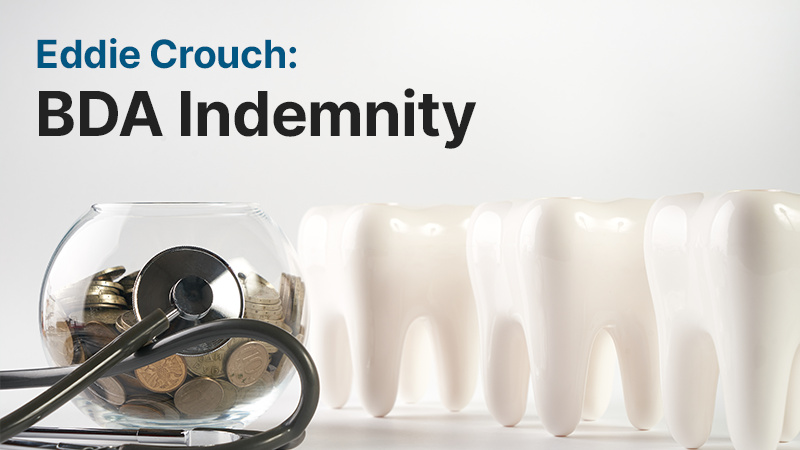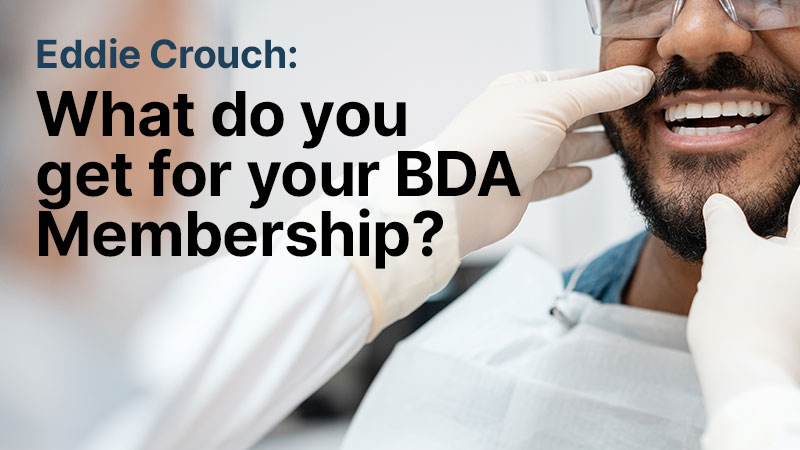Can you just talk about the um how the way the elections work for the different committees,
because there are, I suppose actually before that we should say,
how many different committees there are within the BDA if there's a,
if there's a brief way of doing that, an overview.
Yeah, I mean, I, I, I, I, I think I touched on it earlier that we,
we represent all branches of the profession, um, but we also have a pretty active student
committee, uh, we've got a programme within that that we have,
um, something called the Future Leaders programme, where we got representation from
every, every dental school, married up with um a senior person at the BDA for them to find out
more about the BDA so they can go back to their dental school and tell them.
You know, a little bit more of what's going on behind the scenes.
Uh, we've also got a really active young dentist committee,
um, and with some of the policy stuff that's come through recently about,
you know, tying, tying dentists into the NHS for a period of time,
about recruitment and retention, and about career pathways,
um, you know, various other things uh about.
Overseas registrants coming in and joining the thing, I,
you know, we, we, we have a a wide variety of committees, uh,
with a whole range of experience, and I'm really, really pleased that in this current
round of elections, nearly every single one of our committees has got some really,
Um, young participation in it, um, in that, you know, we have
young dentists who are, you know, in the 1st 10 years of their career that we embed across the
whole of, um, Uh, our committee structure. Obviously our general dental practises
committees in in all of the countries and the, the bigger general dental practise committee
that incorporates all those, um, is our biggest committee.
Um, we, we also have a council, so we have an English council,
the Scottish council and a Welsh council where they, they bring together all the committees
that represent the the profession in their own particular countries,
and they formed a UK council, which is the, the body that holds the peg to account,
the board of directors. The board of directors have to um have to
adhere to trade union law, so we, you know, people say,
well, why, why, why do the peck elections have to be done on paper?
You know, we, we try and make it as easy as possible.
We send out a bloody ballot paper with a stampta dress envelope on it for people to
participate, but sadly the participation levels are really low.
But, you know, trade union law in this country is antiquated.
We still have to elect a direct board of uh of a trade union directly through a postal ballot
system. Uh we have 15 PEC members.
We have one that represents each of the Northern Ireland,
Scotland and Wales. We have 3 UK wide seats and we have 9 seats
that represent uh regional areas that fit in with our branch structure of the BDA uh but we
also have other advisory committees to to the pec, um,
we have uh an education and ethics team.
Uh sorry, committee, we have, um, other, other committees that like a pensions
committee, Health and Science Committee, other committees that actually feed into the board.
Essentially, we give autonomy to those committees to make their own decisions to
make representation, you know, if we've got, Uh, policy that is conflicted across
several committees. We, we have a joint chairs committee where we
get people to sit round the table and, and negotiate and talk through some of the issues
that are there. Um, but the ultimate arbiter of decision making
on policy is the peck.
Um, you know, when we had industrial action recently, and we had lots and lots of our
hospital members involved in that.
And they came to the board and said, look, we want a ballot,
our members, um, we supported that.
We, we had to make sure it was done appropriately, cause if you mess up on trade
union law, the fines are horrendous and, you know, in a financial situation we find
ourselves in, we don't want to be fined £25,000 because we sent a ballot paper to the wrong
member. Um, but yeah, it's pretty rare.
That there is a disagreement on policy going forward and,
you know, most things we, we are happy about, but if there was ever a disagreement between
some of the committees, the pet would be the ultimate arbiter of what direction of travel
the uh the BDA would go in.
It surprises me that there's, there's.
Not often disagreement, because the, the BDA is such a broad church representing NHS
private um principals and associates.
There, there must be tension between all the different groups that you're trying to
represent. The danger is that you end up then trying to
appease everyone and, and having no policies because you can't agree on anything.
I, I, I'm surprised there's not more disagreement beforehand,
before it goes, uh.
Out to public and be signed off as as a policy by the BDA.
Yeah, I mean, I, I, I, you know, there's disagreement in every one of our committees,
um, but we work on a, um, you know, a, a, a principle that,
you know, that every committee will adhere to the majority,
you know, uh, we, we have, we have policy disagreement, we have business disagreement,
I mean the board of directors is responsible not only for,
Um, the policy direction of the BDA, but it's for making sure that the BDA actually survives
in the business, and, you know, we've had to make some difficult decisions recently,
um, with, with the move from Wimpole Street, and, You know,
there will be dissenting voices within any committee, um,
but we take, we take a vote, we, we have a, a vote in in in the committee,
and we take collective responsibility. So once the pecker has actually made the
decision, um, you know, we might have one or two members on,
on the board that don't agree with that, you know, and,
and had a different point of view.
But they know as directors of the BDA that once the decision is made,
we, we go forward with a unified decision making process.
Eddie Crouch: Committees and representation
9 June 2025
Chair of the British Dental Association Principal Executive Committee, Eddie Crouch, discusses the various committees within the British Dental Association and who they represent.
Eddie MacKenzie interviews Eddie Crouch, chair of the BDA, Part 4.




